- How do Baiga women look at themselves? Here no marriage happens unless the women consents? How do man and woman separate and re-marry? Thus, using urban sensibilities who is modern-who is conservative?
The Baiga’s are one of the 700+ tribes of India. Documentary filmmaker and photographer Akanksha Damini Joshi has spent many years filming the lives of the Baigas who consider themselves the first humans on earth. She shares some of her experiences as a modern urban woman with the women of this ancient tribe. (Author
visited in 2011).
The roads are wet,
slushy. I am thinking I am going to be stuck in the forest all night. This
forest is no ordinary forest, it is achaknak
maar - suddenly, attacked. But the driver, Ravi, is a great sport. He knows
how to twist with the road. We finally reach a village.
I am told its name, Dongar Mahua. Sweet, how sweet it sounds. I get off the vehicle. The leaves rustle beneath. Their sound is like a scream. Shhh. Don't make so much noise. The time for stillness is coming.
It is twilight. The Baiga village is preparing for the night.
Dongar Mahua is
like any Baiga village. It has maybe 5-6 or max 10 homes. All made of mud,
wood. Patched here and there. Holes here and there. The homes are not huddled
together like campers tents. No. There is ample nature surrounding each.
You see, The
Forest - trees, birds, animals, even tigers included - is their home. The house
is just protection from weather.
I am filming.
Playing, really. With the evening sun. Shining magic through the trees, into
camera lens, into my eye lens, and poof! Into my heart. It’s one of those many
moments of union via camera.
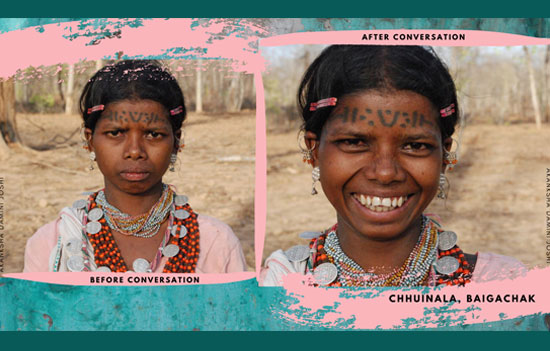
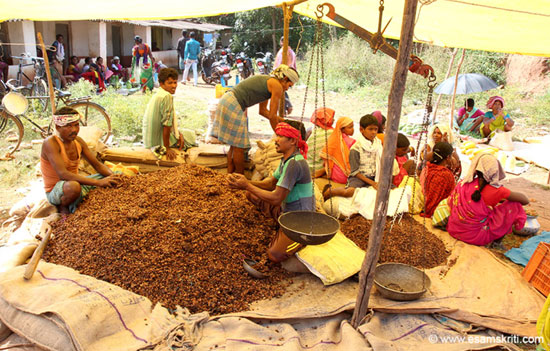 Mahua plant i.e. used to make Mahua drink.
Mahua plant i.e. used to make Mahua drink.
Suddenly, I hear
giggles. A group of 4-5 women. They pull me into their hut, camera and all. I
am a little taken aback. They are all Happy Baiga women. Mahua-high. They offer
me some. I apologies, pointing to camera as my excuse. They laugh. A full belly
nature roar. Then, they giggle, like little girls. Soft, tender. Caught in
between this wild energy play. I feel very, very small. Very ... shy.
I know this is an
energy space inhabited only by the feminine. It has no place for hypocrisy of
culture, of manners, of separation, of division. It is wild-roaring plus
light-innocent. Both, at the same time!
Without a drop in
my system I am floating. High. But still, very, very shy.
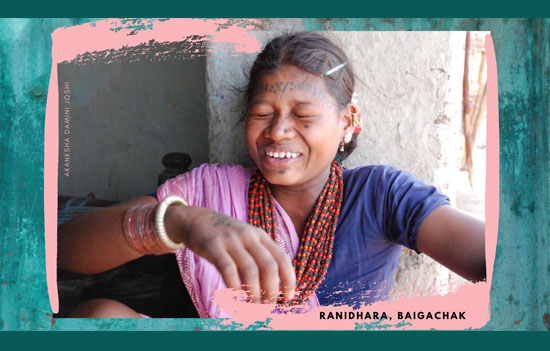
Unlike the urban
women, these women - elder to me in age, and in maturity - are comfortable with
my body. It’s like their own. I am them. They are talking to me in their
language, but the language is not just words, its touch. Touching my cheeks,
nudging my shoulders. Its mother play.
I sense they are asking me about the men in the car with me. The questions are bordering in an area that's freaking my urban professional sensibilities out. And yet, there is no offence felt, it is so innocent and playful that all I am feeling is ... terribly shy.
Suddenly made
aware of my identity not as a camerawoman but as a woman. For all my education,
all I can offer to them as a response is a blush!
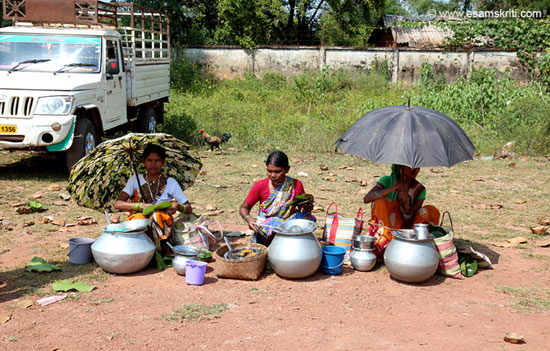 Adivasi ladies selling Mahua drink at weekly Haat market, Bastar 2018.
Adivasi ladies selling Mahua drink at weekly Haat market, Bastar 2018.
One of the six system of marriages in Baigas is based on dance and elopement. It is called 'ले भागा, ले भागी'. He eloped, She eloped.
The Baiga are very graceful dancers. The young men of one village go to another for a ceremonial dance, blessed by the elders, the panchayat. Amidst wild joy, blessings and grace, they dance all night with the young women of the village.
Then. Each young
woman chooses a man. Mind you, in all the marriages of the Baigas, the women take the lead. No union can happen without their consent first.
In this too, the
women take the man of their choice into the forest and spend the night in
union. In the morning the couple comes to be blessed by the elders, the village
community. They are, thus, considered married.
In another form of marriage of the Baigas, if the man can't pay the Bride price, and he really wants to marry the girl. No problem. He is married off. But he is under watch. Careful scrutiny. Girl's parents, panchayat. Everybody. His conduct is evaluated after a full year. If it is OK, THEN, they have a grand marriage celebration!
In another form if
a woman - unhappily married or unmarried - wants to marry another man, then she
informs the village elder of that village. She is taken or goes and squats in
the home of the man. Bas. If man is ready, then done! If she is married then the
bride price is to be paid to her husband in the presence of the panchayat. If
unmarried, then parents.
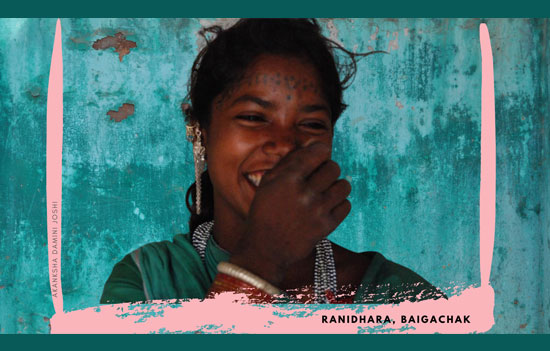
Really. Now.
Who is to say who
is primitive, who is modern, Who is educated, who is illiterate. Who is right,
who is wrong. Who is civilised, who is backward.
For the Baiga's the Earth is the woman. The woman is the Earth. She is granted her ways, her rhythms. By the tribe. By the elders. But, again, all this, WITHIN limits of the tribe. There is no absolute social freedom. It is simply not the nature of life on earth.
Ah, Hang on!
That wild-roar?! The light-innocence?! The magic touch of the Mother Baiga?! Ah, YESS. In those tender fleeting moments ... THERE lies the possibility of absolute freedom!
Freedom to love,
to giggle, to be One. Even with a rather awkward urban woman who walked one
evening into the village of Dongar Mahua, Baigachak.
Akanksha
Damini Joshi is an award winning documentary filmmaker, cinematographer, writer and a meditation facilitator. Digital Image Art and Photographs by the author. More
on her at www.daminijosh.in